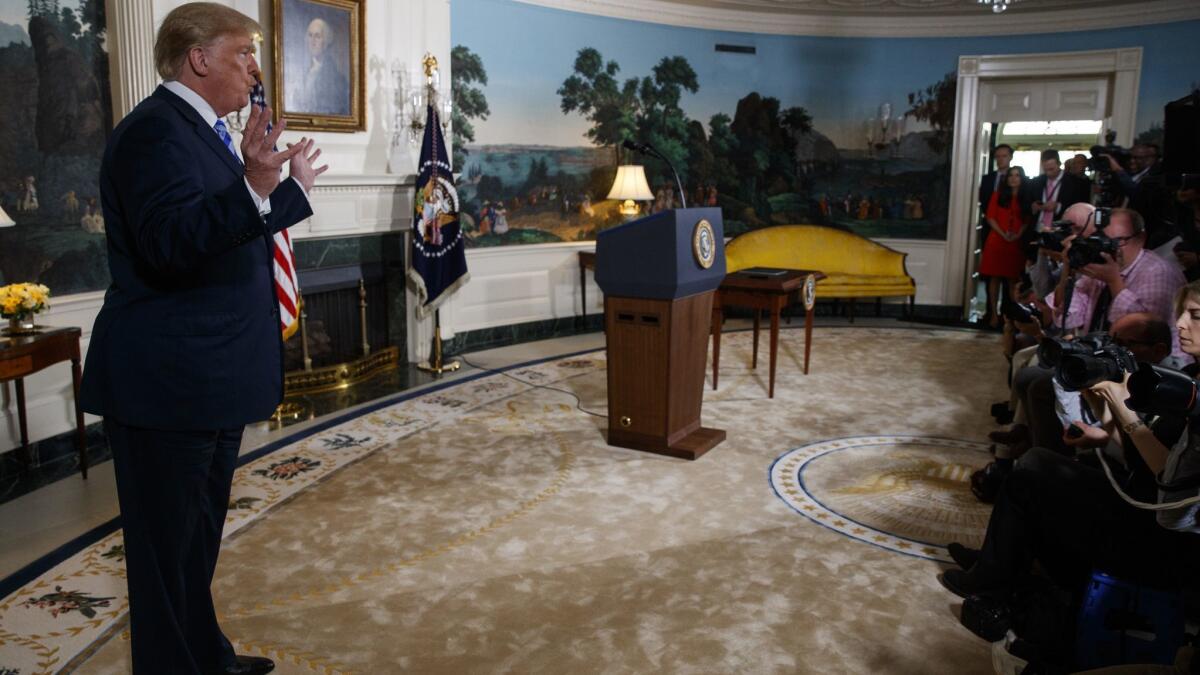Editorial: Did Trump just put the world in danger for little reason other than to stomp on Obamaâs legacy?

President Trump on Tuesday finally did what wiser heads in his administration have been trying to keep him from doing almost from the time he was sworn in: He announced that he would withdraw the United States from the Iran nuclear agreement. In doing so, he rejected the pleas of Americaâs closest allies and more than 100 current and former senior diplomats. He even turned a blind eye to his own Defense secretaryâs conclusion that the agreement has allowed robust monitoring of Iranâs activities.
But as alarming as the action itself was the deceitful and demagogic speech in which he attempted to justify it. It was virtually indistinguishable from the sort of rant Trump delivered on the campaign trail â utterly uninformed by the sort of appreciation for complexity that experience confers on most occupants of the Oval Office. And much as we would like to think the president was motivated by a belief, however wrongheaded, that tearing up this agreement would lead to a better one, itâs hard to escape the suspicion that he was more influenced by a compulsion to besmirch the legacy of his predecessor.
Trump spoke four days before he must decide whether to again waive the economic sanctions against Iran that the U.S. lifted to comply with the agreement, which Iran negotiated in 2015 with the five permanent members of the U.N. Security Council, Germany and the European Union. In his speech, Trump said not only that he wonât waive the sanctions but that the U.S. will âwithdrawâ from the agreement, which he called a âdisastrous dealâ that has caused âgreat embarrassment to me as a citizen.â
Trumpâs attack on the agreement was characteristically misleading and short on detail.
But Trumpâs attack on the agreement â reminiscent of his irresponsible decision to pull the U.S. out of the Paris agreement on climate change â was characteristically misleading and short on detail. For example, he described the limits on Iranâs nuclear activities as âvery weak,â a laughable characterization in light of the elaborate requirements of the agreement. Hereâs one illustration: Iran had to give up most of its ability to enrich uranium and agreed to place the vast majority of its centrifuges in storage under the oversight of the International Atomic Energy Agency.
Trump is rightly concerned that several provisions of the agreement â known as the Joint Comprehensive Plan of Action â expire or sunset after 10 or 15 years, a condition he called âtotally unacceptable.â Ideally the agreement would have made those provisions permanent. He also was right to complain in his speech about Iranâs development of ballistic missiles and its support for militant groups in the region. But those were the compromises required to strike the deal in the first place. There is nothing about abrogating or repudiating the agreement that puts the U.S. in a stronger position to command concessions.
In a statement issued after Trump spoke, the leaders of Germany, France and Britain acknowledged the need to address what happens to Iranâs nuclear program after some of the provisions of the current agreement expire, as well as their concern about Iranâs ballistic missile program and its âdestabilizing regional activities, especially in Syria, Iraq and Yemen.â But the European leaders suggested that that new approaches could be identified without violating the agreement. Trump offered no convincing argument to the contrary.
What was perhaps most bizarre about Trumpâs speech was that it both flirted with advocating regime change in Iran â the president referred to the Islamic government there as a âdictatorshipâ that had seized power â and simultaneously offered to engage it in negotiations toward a new nuclear agreement. Why would he think Iran would be inclined to accept his overture?
In their statement, the European leaders noted â as they likely did in their private conversations with Trump â that the International Atomic Energy Agency has concluded that âIran continues to abide by the restrictions set out by the JCPOA, in line with its obligations under the Treaty on the Non-Proliferation of Nuclear Weapons. The world is a safer place as a result.â Therefore, Britain, France and Germany will remain parties to the agreement and âwill work with all the remaining parties to the deal to ensure this remains the case including through ensuring the continuing economic benefits to the Iranian people that are linked to the agreement.â
The full consequences of Trumpâs decision cannot be known, but they almost certainly will include a further erosion of Americaâs credibility with its allies and others, and tacit encouragement for Iran to revive its nuclear program. That will be bad for the country and for the world.
Follow the Opinion section on Twitter @latimesopinionand Facebook
More to Read
A cure for the common opinion
Get thought-provoking perspectives with our weekly newsletter.
You may occasionally receive promotional content from the Los Angeles Times.










